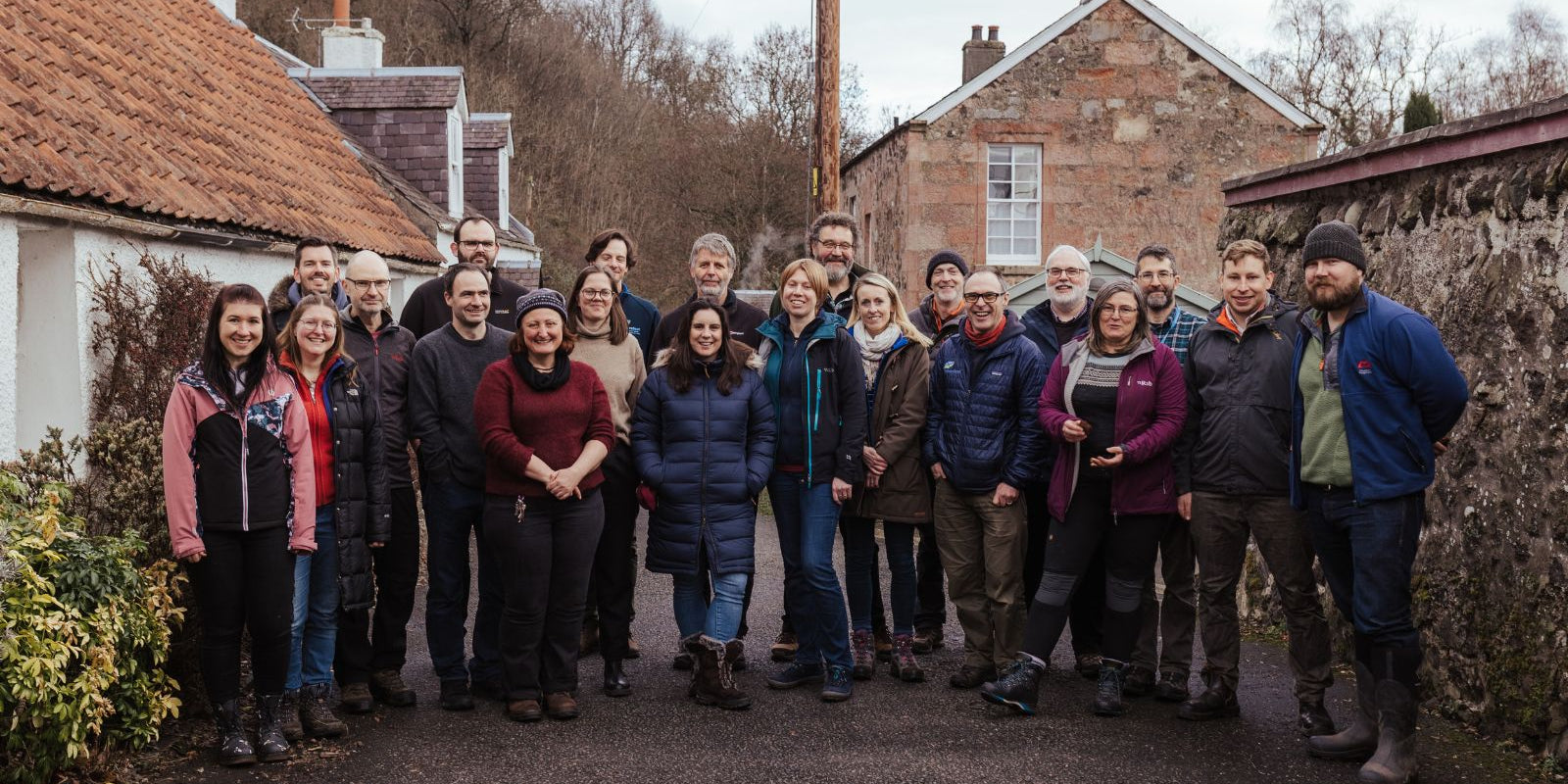The Future Forest Company (FFC) team met up with the the public sector partnership working on private investment in natural capital in Scotland at our Dumyat site, beside Stirling. The partnership Includes economic and environmental leads from across Scottish Government and the wider public sector including NatureScot, Highlands & Islands Enterprise and the Hutton Institute.. The focus of the day was to discuss natural capital market opportunities and challenges.
What is Natural Capital?
In brief, the term ‘natural capital’ can be defined as the world’s stocks of natural assets which include geology, soil, air, water and all living things. It is from this Natural Capital that humans derive a wide range of services, often called ecosystem services, which make human life possible.
The Scottish Government is committed to developing a values-led, high-integrity market for responsible investment in natural capital, that helps deliver policy goals for economic transformation, climate change and biodiversity, and that provides community benefits.
Outlining principles for the developing natural capital market
The Scottish Government has outlined interim principles for responsible Investment In natural capital for organisations to deliver, here we will touch on just a few.
Integrated land use
Investment and management decisions on Integrated land use must demonstrate consideration of positive and negative impacts across all four capitals (natural, social, economic, human). At The Future Forest Company we have a holistic land management approach and were excited to discuss our ethos and demonstrate some of our successes to date as well as the challenges we face as a new company in Scotland to achieve these goals.
The meeting headed out into the Blairlogie fields at Dumyat, near Stirling to discuss upcoming work on FFC reforestation and biodiversity enhancement projects on-site.

Benefiting local communities
Another one of the key principles focuses on community, outlining that investment in and use of Scotland’s natural capital should create benefits that are shared between public, private and community interests. Current investment and future increases in land and ecosystem services value should benefit local communities. In addition, investment and management decisions should support Community Wealth Building by reinvesting value in local economies to their long-term benefit.
Supporting local, rural communities is at the heart of what FFC do. There was much discussion on what FFC was doing to achieve this goal. This included FFC’s work to closely consult with the local Blairlogie community and beyond; our partnership working with the University of Stirling, local naturalists and TCV Scotland, and our use of local contractors to carry out key survey, planting, photography and other work. We are working to improve accessibility for all on our sites; we want our land and forests to be enjoyed by local communities for years to come.

High Environmental Integrity
As we all know, carbon offsetting is not a silver bullet to the climate crisis, it is vital that we reduce and remove carbon emission from the atmosphere. The Scottish Government have included this vital point as one of the guiding principles, stating that investment in offsetting should not be a replacement for emissions reductions and should always be made in addition to having plans and demonstrable actions in place to reduce emissions as close to zero as possible, and as part of targets and transition plans aligned with the Paris Agreement.
Investment in natural capital for carbon management should be both measurable and verifiable, such as through the government-backed Woodland Carbon Code and the Peatland Code.
At The Future Forest Company we register our carbon with the Woodland Carbon Code and all of our peatland restoration projects are registered with the Peatland Code, in order to verify the carbon emissions reductions made.

Discussions continued around the need for verifiable standards for Biodiversity assessment in Scotland and the need for a Soil Carbon Code. Challenges such as additionality rules and landscape-scale working were also aired for debate. Ross Johnston, Head of Natural Capital Policy and Valuation said,
‘It is really helpful for our programme partnership to learn from the practical experience of natural capital market stakeholders and businesses. We are grateful to the Future Forest Company team for making the time to host our visit and for their honest and informative reflections on working in Scotland and on the role the public sector can play in supporting businesses to deliver our high-integrity and values-led vision for the natural capital market.’
You can view a the full guide to the Scottish Government’s interim principles for responsible investment here.

What happened on the day?
During the day presentations were given by Jim Mann, Tom Newell, Lindsay Mackinlay and Jamie Adcock introducing The Future Forest Company’s sites and reforestation, biodiversity, and peatland restoration work. Active discussions took place between all staff on the day, including on the future of biodiversity enhancement metrics, education for rural stakeholders unclear about ‘carbon’ and biodiversity opportunities and the timeline for Scotland’s Natural Capital framework amongst other pressing topics. It was our pleasure to share our work and to be able to give an insight into some of the challenges and opportunities that lay before us.
Lindsay Mackinlay, FFC Head of Biodiversity, said
‘It was a really useful, positive and engaging day! Active discussions on the way forward to achieve natural capital goals in Scotland were discussed and examined by us all. We were really pleased that the Scottish Government and other teams took the time to come out and listen to our experiences from the ‘front-line’ of such work. Such interactions are vital if we are all going to get this right. We learnt a lot too and it’d be great to make this a regular meeting.’
